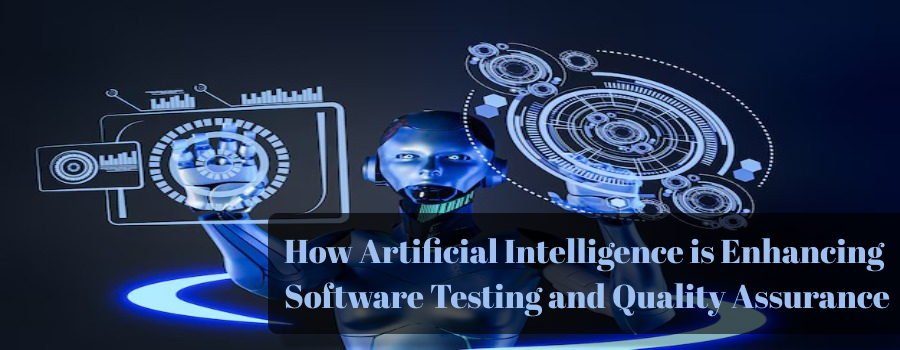Posted on: Oct 4, 2024
Estimated reading time: 0 minutes
How artificial intelligence is enhancing software testing and quality assurance.

Introduction:
In the constantly changing landscape of software creation, the urgency for quicker updates, flawless operation, and dependable systems has reached new heights.
While crucial, conventional approaches to software testing frequently struggle to adapt to the increasing intricacy and rapidity requirements of contemporary development.
This is where artificial intelligence (AI) steps in, transforming the field of software testing and quality assurance (QA) in ways never seen before.
The Growth of AI in Software Testing:
Software testing is just one of the many industries where artificial intelligence (AI) is gradually becoming more and more prominent.
Traditional testing techniques are frequently found to be insufficient in terms of speed and accuracy due to the increasing complexity of software applications. Artificial intelligence (AI) fills in these gaps by recognizing patterns, automating repetitive tasks, and providing predictive insights.From basic unit tests to intricate integration tests, AI technologies are being utilized to improve the effectiveness of software testing procedures.
Through the use of machine learning algorithms, these technologies can easily adjust to new testing situations, thereby decreasing the amount of time required for manual test case creation and implementation.
The Function of AI in Software Testing:
Here's the way AI is transforming the field of testing and quality assurance:
Intelligent bug detection:
AI is very good at identifying bugs in the code because it is very good at recognizing patterns. AI can identify anomalies during testing, saving downtime and raising the caliber of the software as a whole, rather than waiting for a bug to cause a system failure.
Analytics with prediction:
AI can evaluate historical data from previous testing and development cycles thanks to its predictive capabilities, which give it insights into potential problem areas.
QA teams can improve software performance and reliability by concentrating on the most susceptible areas of the program and anticipating possible failures.
Scaling test automation:
Artificial intelligence (AI) facilitates the streamlining of monotonous and labor-intensive activities that humans typically carry out.
Through AI-driven testing instruments, the creation, implementation, and revision of test scenarios can be done automatically, significantly cutting down the duration needed for testing phases.
Additionally, these instruments are capable of managing extensive data sets, rendering them perfect for expanding in large-scale projects.
Self-learning platforms:
A key benefit of using AI in software testing is its capacity to acquire knowledge and enhance its capabilities as time goes on. Tools powered by AI can examine previous test outcomes, understand errors, and consistently enhance their efficiency.
This results in more intelligent test scenarios that adjust to modifications in the code and changing needs of the software.
Intelligently prioritizing test cases:
AI can rank the most important test cases by examining user behavior and usage trends. This guarantees that the testing procedure concentrates on the most utilized and crucial features, providing quicker feedback on crucial software components.
Predictive Analytics: Foreseeing and Mitigating Issues:
A key use of AI in the realm of software testing is through predictive analytics. By examining past data and spotting trends, AI can forecast possible problems ahead of time.
This forward-thinking strategy enables groups to tackle weaknesses before they become major problems, lowering the chance of severe malfunctions after the software is released.
Predictive analytics can also assist in distributing resources, and pinpointing which sections of the application are most prone to problems and require additional testing. This guarantees that testing efforts are concentrated where they are most required, maximizing both time and resources.
AI-Powered Quality Assurance: What's Next in Testing
The incorporation of artificial intelligence into quality assurance procedures goes beyond a mere fad—it represents a transition towards more intelligent, quicker, and dependable methods of software testing.
As the technology progresses, AI-powered testing instruments will be a crucial component of quality assurance plans for companies striving to keep up with the rapid pace of the digital era.
AI isn't designed to take over the role of human testers but rather to enhance their skills, enabling them to concentrate on more significant strategic duties while AI takes care of the mundane and repetitive elements of testing.
By adopting AI, companies can enhance the quality and dependability of their software, as well as secure a competitive advantage in a rapidly evolving digital environment.